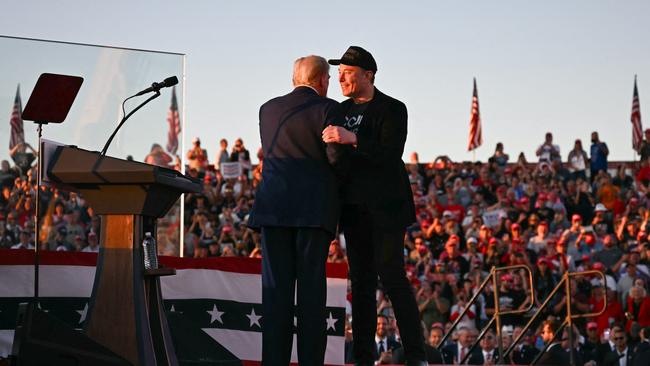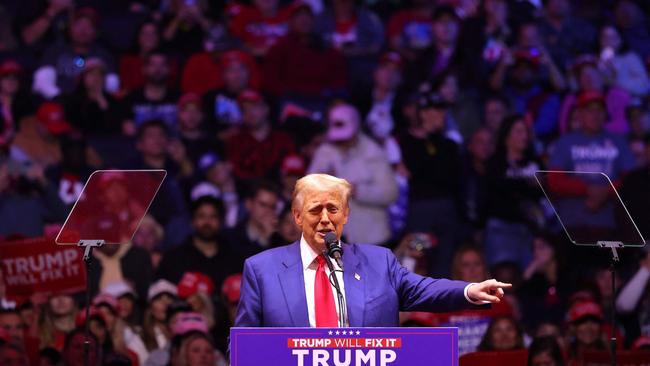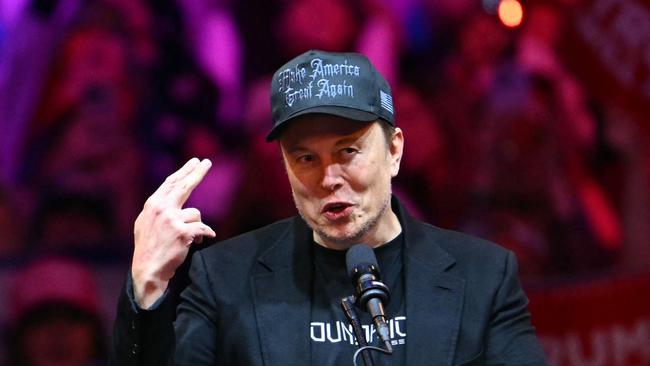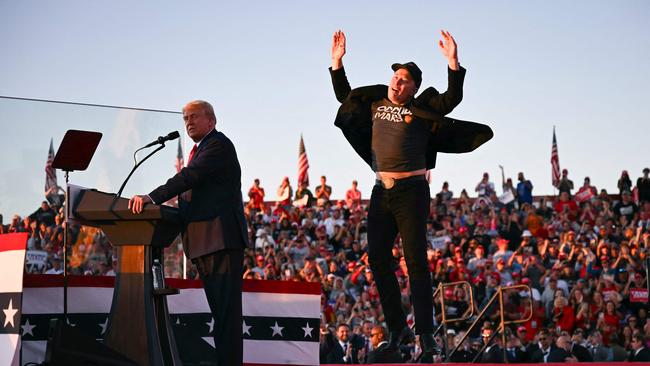If Trump wins, buckle up for Elon Musk’s shock therapy
The billionaire owner of X has vowed to use his ruthless management style to cut US government spending by a third if the ex-president returns to the White House.

Should Donald Trump win the election this week and appoint, as he has promised, Elon Musk to spearhead a startling plan to slash government spending by nearly a third, government workers would do well to stock up on toilet paper.
When Musk bought Twitter in 2022, he wielded the axe swiftly and wildly. He got rid of nearly 80 per cent of the San Francisco company’s workers and contractors, shut data centres, closed offices, stopped paying landlords and even fired cleaning staff. In those early days, employees took to bringing their own toilet paper to the office amid a shortage of such basics. Musk argued that the shock therapy was necessary. He compared the loss-making company, since renamed X, to a “plane that is headed towards the ground at high speed with the engines on fire and the controls don’t work”.
It appears he views the federal government to be in a similar state. At Trump’s now-infamous New York rally at Madison Square Garden, Musk told the crowd last week that he could cut “at least dollars 2 trillion” in government spending, nearly a third of the dollars 6.2 trillion annual budget. “Your money is being wasted,” he said. “We’re going to get the government off your back and out of your pocketbook.”

The notion of Musk applying his famously brutalist management style to the biggest business in America - the federal government employs about three million people - has stirred enthusiasm among Trump loyalists and alarm from Democrats who forecast utter chaos. Musk has not disabused people of the former. In response to an X user predicting a “severe overreaction” that would see markets “tumble” should Musk follow through on his promises, the 53-year-old billionaire responded: “Sounds about right.”
What is inarguable is that Musk is one of the greatest entrepreneurs of his generation who has, more than once, made the virtually impossible happen. He turned Tesla into the world’s most valuable car company and sparked the electric vehicle revolution. SpaceX built the largest rocket ever, then caught it upon re-entry last month with what were, in effect, giant metal chopsticks. X, however, provides the best analogy for how Musk might approach the federal government.
When he walked through the door of the social media platform two years ago hefting a porcelain sink, it was a notorious corporate basketcase that, in its 16 years of existence, had never turned a profit. It was bloated, inefficient and beset by boardroom drama.

Similarly, the federal government is a money-losing enterprise. Last year it spent dollars 6.2 trillion, but brought in dollars 4.5 trillion. In other words, it is losing dollars 5,000 for every citizen in America. The national debt meanwhile has climbed to dollars 35 trillion, pushing the annual interest bill past dollars 1 trillion - more than the entire defence budget.
At all of his companies, Musk is infamous for what his former girlfriend Grimes - the mother of three of his 11 children - called “demon mode”. The term describes his bouts of maniacal urgency, kneejerk firings and merciless dressing-down of employees. One gets a sense that solving the “problem” of government will stir the demon.
At a recent tech conference, Musk said his “Department of Government Efficiency” - the acronym, DOGE, is a play on his favourite cryptocurrency, Dogecoin - would have before it a “once-in-a-generation” opportunity to remake the government “operating system”. He would zero in on two areas: the thicket of regulations it produces and enforces, and the sheer size of government.
On the former, Musk, who was once a Democrat but has turned into Trump’s most prominent public cheerleader and one of his top donors, likened America to “Gulliver tied down by a million little strings”. Musk has routinely got in fights with regulators, from the stock market watchdog to the transport safety administration. Referring to a recent fine the environment regulator levied on SpaceX for the spillage of wastewater, he said: “What’s happening is that we get regulations and laws accumulating every year until eventually everything is illegal.”
So how will he unpick the tangle? X, again, provides a blueprint. Not long after taking over, he introduced new features in real time and cancelled others, marking a stark change from the previous Twitter management’s more careful, if sclerotic, approach. Some of those features had to be reversed or changed days or weeks after their release, much to the delight of his many critics.
With government rules, he said he would just start cutting and be “very public” about it. “We could just say, ‘Which of these rules do you like?’ If the public is really excited about a rule and wants to keep it, we’ll just keep it. And if [getting rid of] the rule turns out to be bad, we’ll put it right back. Problem solved. It’s easy to add rules, but we don’t actually have a process for getting rid of them. That’s the issue. There’s no garbage collection for it.”
One wonders how this would work in reality, not least because so many rules - such as those regulating self-driving cars, pollution or product standards - are designed for public safety.

His other focus would be to dramatically shrink government by firing potentially hundreds of thousands of people. Musk said he would not just throw people out on the street, but he would give them “a reasonable off-ramp where, you know, they’re still earning, they’re still receiving money, but they have a year or two to find jobs in the private sector”.
But he also opposed the notion that cuts could be done incrementally. Better to do it swiftly, and at large scale - like he did at Twitter. “If there’s a once-in-a-generation opportunity, and you don’t take serious action, and then you have four years to get it done. And then if it doesn’t get done ...” he said, before trailing off. Politicians, he added, were “whistling past the graveyard” by allowing spending to spiral. He added: “This does not end well.”
Trump is not the first presidential candidate to promise a root-and-branch overhaul of government. Both Ronald Reagan and Bill Clinton launched such efforts. The former was largely fruitless because most recommendations required law changes that were deemed impractical or too difficult. The effort by Clinton was more successful, leading to a reduction of more than 400,000 jobs over eight years that resulted in the smallest federal apparatus in 40 years.
In an interview with the TV personality Tucker Carlson last week, Trump said that Musk “doesn’t want to become a secretary of something”, suggesting a more informal role could await him in government. That might reassure investors in Musk’s various companies, where he is already spinning multiple plates. In addition to time-consuming jobs at Tesla, SpaceX and X, Musk is chief executive of the Boring Company, which bores tunnels; founder of Neuralink, which creates computerised brain implants; and founder of xAI, an artificial intelligence startup, which last week was said to be in talks over a funding round that could value it at dollars 45 billion.
For critics, the worry is that if indeed Musk becomes the master of DOGE, the federal government could turn out like X. The company has seen revenues fall by an estimated 50 per cent since his takeover, as advertisers have fled a platform that feels more chaotic and less civil than it used to. The value of the company has plunged by 80 per cent. Musk, however, appeared unbowed. “The reality is that if you get rid of nonsense regulations, and shift people from the government sector to the private sector, we will have immense prosperity,” he said. “I think we’ll have a golden age in this country.”
The Times
